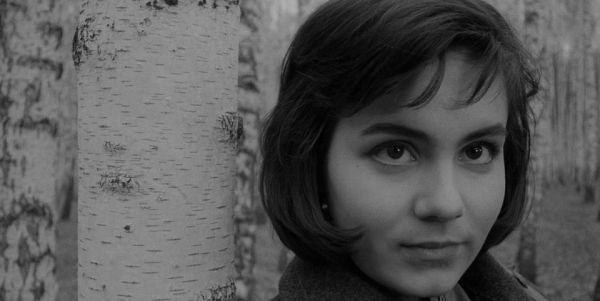About midway through Andrei Tarkovsky’s feature 1962 film debut of Ivan’s Childhood, in the midst of a Russian battlefield field torn asunder during World II, a cross is backlit by a setting sun. The cross is obscured in shadow and yet its beauty remains. A spiritual man, Tarkovsky was never afraid to ask questions about spiritual matters. According to him, “Every art carries within it a religious purpose.” This particular visual composition seems to debate whether we live in a world in which God’s watch has concluded, or if God continues to work within humanity’s darkness.
As with all of his questions, Tarkovsky provides no direct answers to his metaphysical inquiries – only more images. Within his images and the film’s story, we learn that the circumstances in which humanity – and in particular our youth – find themselves certainly seem quite dire.
In Ivan’s Childhood, the altar of ultimate victory in war demands high sacrifices and the abuse of our youth – think of the story of Abraham and Isaac if an angel didn’t intervene. Within Tarkovsky’s world, adults seem to understand the impact of these abuses but remain complicit in these tributes.
Abuses of Youth
12-year-old Ivan Bondarev is an absurdly young Russian soldier during World War II. Ivan has just completed a reconnaissance mission and is able to find a safe haven in the Russian forces led by Lieutenant Galtsev. Unable to believe that someone so young would be a member of an elite Russian task force, Galtsev is initially hesitant about Ivan’s secretive role in the war.
He eventually relents when he discovers that Ivan is the favorite of several high-ranking Russian officers. Interestingly enough, Galtsev is a mirror of Ivan in some ways; he too is young and looks to protect those whom he loves.
We learn that Ivan has joined the cause of war because Germans murdered his mother, and the boy has sworn vengeance on the invading forces. Strangely enough, throughout Ivan’s Childhood are interspersed Ivan’s dreams of happier days filled with childish play. These dreams suggest that Ivan’s personality is a bifurcated one – he slumbers with happy dreams of days passed but his conscious world is consumed by rage.

Ivan’s superiors, instead of seeking to quell his blood-lust, tragically seem content to utilize it. One of his superior officers comments that if Ivan were to be told to leave the battlefield that “he’ll go [back] on his own” and then “it’ll only be worse.” All of Ivan’s officers seem to have condemned him to perdition, with the exception of Galtsev. Ultimately, he is assigned to another secret mission from which he shall not return. Galtsev is the only officer who objects to this mission.
In an alternative, and perhaps unfairly minimized story-line in Ivan’s Childhood, a young and beautiful female nurse named Masha is forced to endure constant seduction attempts from her male superior, Captain Kholin. In one intense scene, Kholin grabs Masha to kiss her while he holds her over a trench. Thus, Masha has two choices – kiss her commanding officer or be injured from the fall into the underlying pit. Tarkovsky could be commended for featuring a woman to act as a lead in such a masculine-driven genre, but I cannot help but feel that this story-line would have been strengthened if we had more understanding of the impact of war on young women.
Ivan and Masha exist in a world that continues to deny their innocence and becoming (by becoming, I mean their growth into beings with an individual identity and an understanding of their agency). Russian officers laugh at Ivan when he declares that he is his “own boss” in this war. Masha and Ivan’s development is denied, as they are held hostages to the will of others – and those wills have been corroded by a thirst for victory and blood. While Masha ultimately survives because Galtsev orders her off the battlefield, Ivan is not as fortunate.
The Utility of the Young
Tarkovsky clearly recognizes the importance of childhood, specifically for the artist. In an interview in 1978, the filmmaker stated that in order to be truthful, “the artist lives off his childhood like a parasite.” Thus, the thoughts and hopes of a child must be respected for successful development into adulthood; in Tarkovsky‘s film, war totally lacks any form of this regard for the value of youth.
Instead, Ivan’s Childhood depicts a world in which the greater good of victory (Tarkovsky depicts this accomplishment with Russian celebratory musical score playing in conjunction with images of destroyed Nazi buildings and the charred body of Goebbels) tragically supersedes the worth of a childhood. In the tragic finale of the film, Galtsev finds the papers that document Ivan’s final moments of life and how it ended. Subsequently, we are granted images of a happy Ivan in his dreams, as he should have been in reality. Yet, in this scene we realize the truth; in a world demoralized and stripped by war, Ivan’s childhood only existed in his dreams.
Final Notes and Inquiries
Ivan’s Childhood provides a fitting opening to Tarkovsky‘s filmography and rightfully suggests that this filmmaker had even more to offer the artistic world. I consider Tarkovsky to be the greatest director we have ever seen, and in order to encourage fans of cinema to study his works, I will be releasing an analysis for each of his films over the next few months.
Are there any particular thematic elements you would like for me to address in my essays? What is your take on Ivan’s Childhood? Did my analysis miss any important points, in your opinion?
Does content like this matter to you?
Become a Member and support film journalism. Unlock access to all of Film Inquiry`s great articles. Join a community of like-minded readers who are passionate about cinema - get access to our private members Network, give back to independent filmmakers, and more.